Good quality, tasty eggs come from healthy, happy chickens. Nutrition plays a vital role in a chicken’s health and well-being, so it’s important to get their diet right. One thing you might be wondering is, what foods are healthy and safe for your chicken to eat?
Chickens can eat a range of things, including meat, grasses, fruits, vegetables, and grains. However, some foods such as avocados and chocolate are highly toxic to chickens, and chickens shouldn’t eat fatty, salty, or processed foods.
If chickens are fed the wrong food, it can be bad for their health, and in some cases, it can even kill the chickens. So, in order to learn more about your chicken’s diet and get a clearer idea about what they can and cannot eat, take a look at our complete guide below.
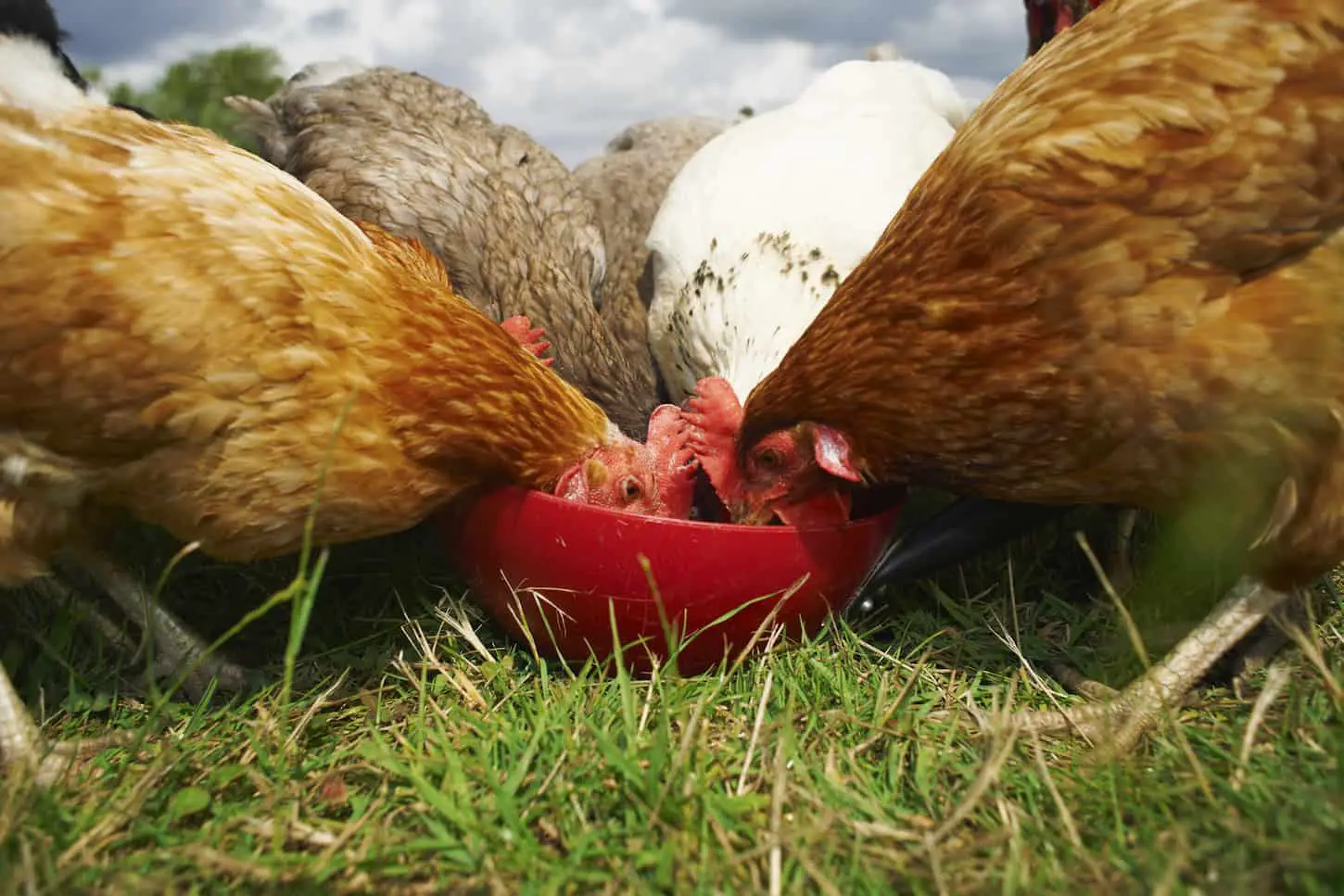
What Do Chickens Eat?
Chickens are omnivores which means they can digest both plants and meat. However, they need a varied diet, and they can’t survive on just one type of food. Chickens can eat a range of fruits and vegetables as treats, but treats should only make up 10 percent of a chicken’s diet.
The amount of food a chicken needs will depend on its age, breed, size, environment, and season. To give chickens the best diet, learn about their nutritional requirements and feed chickens according to their needs.
Chickens need constant access to fresh, clean water, and they generally drink more in the summer. Chickens also need grit; one example is dirt – to digest their food. If the chickens are kept indoors, grit needs to be provided in their diet.
What’s an omnivore?
In the animal kingdom, each creature is either an herbivore that only eats plants, a carnivore that only eats meat, or an omnivore that eats both meat and plants. The word omnivore comes from the Latin words – Omni, which means everything, and Vorare, which means devour.
Just like humans, chickens are omnivores which means they’re highly adaptable because they can utilize all the different foods available in their environment.
Chickens like to forage and will eat almost anything in their path, including small animals and insects. Chickens will even eat each other if they live in crowded, unsanitary conditions.
What do chickens eat in the wild?
Wild chickens are also known as jungle fowl or feral chickens, and they eat whatever they can get their beaks on. Wild chickens adapt their diet to suit their circumstances and have good foraging instincts. They will scratch and dig to get food.
Wild chickens eat pasture plants and grasses such as buckwheat, clover, dandelions, and bluegrass, as well as wild fruits and berries.
In the wild, chickens also eat a range of insects such as grasshoppers, ticks, termites, spiders, caterpillars, worms, beetles, and their larvae. Chickens will also eat small animals such as lizards, frogs, mice, snakes, and the eggs of other animals.
What do chickens eat on farms?
On a farm, chickens usually eat nutritionally balanced chicken feed and grains, specifically designed for their dietary needs. Farm chickens are usually raised for meat or eggs, so they must have a healthy balanced diet.
The main ingredient in chicken feed is grain and grain by-products, such as canola and soybean meal. It usually contains around 10 percent meat or bone meal fats to boost nutrient levels, texture, and taste.
Approximately 1 to 2 percent of chicken feed is vitamins, minerals, and additives such as micronutrients and enzymes, which are vital for your chicken’s general health.
Farm chickens also eat scratch food in addition to grains. Scratch food is a mix of grains and seeds cut into small pieces so chickens can scratch them up off the floor.
Scratch food lets chickens carry out their natural scratching and foraging behavior, so it’s a good boredom breaker for indoor or farm chickens.
Farm chickens, who don’t have access to insects, love fresh or dried mealworms as an occasional treat. Mealworms are full of fat and protein, so they’re fantastic for chickens during a molt. However, chickens can’t have too much fat or protein. They shouldn’t eat more than ten mealworms per day.
What do chickens eat when they are free-range?
Free-range chickens have the best of both worlds. They get balanced chicken food as well as access to an outdoor diet. Free-range chickens will eat whatever’s available, so they benefit more from a free-range environment diverse with plants and insects.
Enrich free-range chickens’ diets by planting fruit trees and grains around their coop or by leaving wild areas on the land to attract insects.
Free-range chickens will enjoy scratching for bugs on a compost heap or scratching at rotten logs for termites and other insects. A free-range chicken diet can also be supplemented with fruits and vegetables.
What plants do chickens eat? Which do they avoid?
Chickens usually only eat plants that are safe for them, and will automatically avoid poisonous plants or plants they dislike unless they’re malnourished.
Want to know more about this, including a list of poisonous plants? make sure you read my article, Plants Chickens Won’t Eat: The Complete Guide, next!
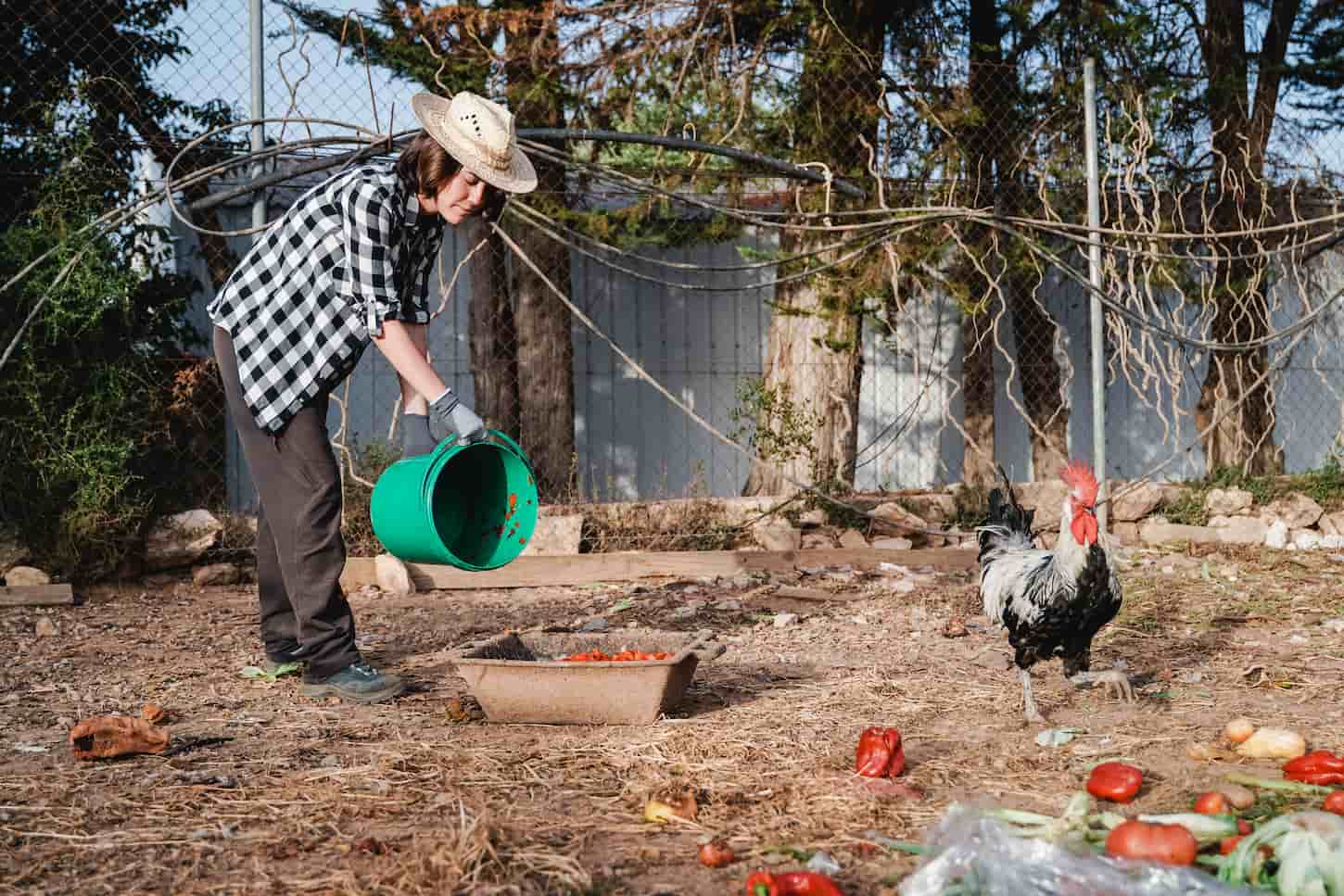
Complete List of Fruit That Chickens Can Eat
Chickens can eat a wide range of fruit. Fruit is a fantastic source of fiber and is full of vitamins, minerals, and antioxidants, vital for a chicken’s health and well-being. However, some fruit can be high in sugar, so always feed the fruit to chickens in moderation.
Take a look at this complete list below to see what fruits are safe for chickens to eat.
- Watermelon/Melons – Chickens go crazy for watermelon, and it’s a fantastic summertime treat because it will help keep your chickens hydrated. Chickens can safely eat all melons including cantaloupe and honeydew.
- Pumpkin and Squash – Chickens can eat all types of squash (yes, it’s a fruit because it comes from a flower and the seeds are inside). Raw pumpkin and squash seeds are good for chickens and may act as a natural dewormer.
- Zucchini – The zucchini is related to squash, so the seeds may help protect your chicken from internal parasites.
- Cucumber – Cucumber is a very refreshing treat for chickens in the summer.
- Tomatoes – Tomatoes are part of the nightshade family, so the plant, leaves, and flowers are toxic to chickens. However, many owners say the fruit is safe for chickens to eat.
- Grapes – Grapes are tasty, nutritious and a good boredom breaker for chickens because they roll around on the floor. Cut grapes up for smaller chickens so they don’t choke on them and feed grapes in moderation because they’re high in sugar.
- Raisins – Raisins are dried grapes and are safe for chickens to eat. However, dried fruit is more concentrated in sugar and nutrients, so only feed your chicken raisins in small amounts.
- Apples – Chickens can eat apples, but most owners remove the seeds first. Apple seeds contain small amounts of cyanide which is poisonous.
- Pineapple – Pineapple is safe for chickens to eat. However, it’s citrusy, and not all chickens like it.
- Cherries – Chickens love cherries but don’t feed them the pits.
- Oranges and Citrus Fruits – Some chicken owners claim citrus fruit is bad for chickens, while others think it’s perfectly safe. Citrus fruits won’t kill chickens, but if they eat too much, it might affect their health and condition.
Not all chickens enjoy eating citrus fruits, but they can safely eat grapefruit, mandarin, oranges, and lemons.
- Pears – Pears are very nutritious, but they’re not a chicken’s favorite treat.
- Berries – Chickens love berries, and they’re full of energy, antioxidants, vitamins, and minerals. Chickens can eat all types of berries, including strawberries, blueberries, and raspberries.
- Bananas – Bananas are very palatable and a good source of potassium.
- Peaches/Apricots/Plums – Chickens love these fruits because they’re soft and palatable, However, always remove the pits because they contain cyanide and are highly poisonous to chickens.
- Kiwis – Kiwis are high in antioxidants, but they’re also high in sugar, so always feed them in moderation.
- Mango – Chickens love mango, but it’s high in sugar and carbohydrates, so always feed it in moderation.
- Pomegranate – Chickens can eat pomegranate fruits and seeds.
- Coconut – Chickens can eat dried and fresh coconut, but don’t feed them sugar or chocolate-coated coconut.
- Papaya – Better to scoop out the seeds first because there’s not a lot of information about their safety.
- Figs – Chickens can eat figs, but not too many because they’re high in sugar.
- Persimmon – Chickens can eat persimmon, but it’s a bit acidic, so feed it in moderation.
What Vegetables Can Chickens Eat?
Chickens can eat most vegetables and leafy greens. Like fruits, vegetables are a good source of fiber, antioxidants, and essential vitamins and minerals. However, vegetables are a treat, so they should be fed to chickens in moderation.
To find out what vegetables can be fed to chickens, take a look at the list below.
- Leafy Greens -Leafy greens such as spinach, kale, and chard are super nutritious and help chickens produce rich eggs.
- Celery – Chickens don’t go crazy for celery, so cut it up first to make it more palatable.
- Asparagus – Asparagus is very healthy for chickens but don’t give them too much because it can make their eggs taste strange.
- Cabbage – Cabbage is highly nutritious and a whole cabbage makes a good boredom breaker for a flock of chickens.
- Carrots – Chickens can eat raw and cooked carrots, but don’t give them canned carrots if they’re preserved in salt.
- Sweet Potato – Sweet potato is high in vitamins and minerals. Chickens prefer cooked sweet potatoes because they’re easier to eat.
- Green Beans – Only cooked beans. Raw and dried beans are poisonous to chickens.
- Cauliflower – Usually, chickens prefer the stems and leaves.
- Lettuce – Chickens can eat all types of lettuce.
- Radish – Chickens can eat radish and its leaves.
- Peas – Peas are a nutrient-dense superfood for chickens.
- Broccoli and Brussel Sprouts – Chickens can eat broccoli and Brussel sprouts. However, they contain goitrogens that can potentially interfere with the thyroid gland. Always feed Brussel sprouts and broccoli in moderation.
- Beets – Chickens can eat beets and their leaves.
- Chili – Chickens don’t have many taste buds, so they will happily peck away at chilies. Chilies may also help to defend chickens against parasites and bacteria.
- Ginger – This may help with your chickens’ circulation and boost their mood.
- Garlic – Garlic has many health benefits, including antibacterial properties. Thus, it’s a fantastic health supplement for chickens. However, garlic may affect the taste of your chicken’s eggs.
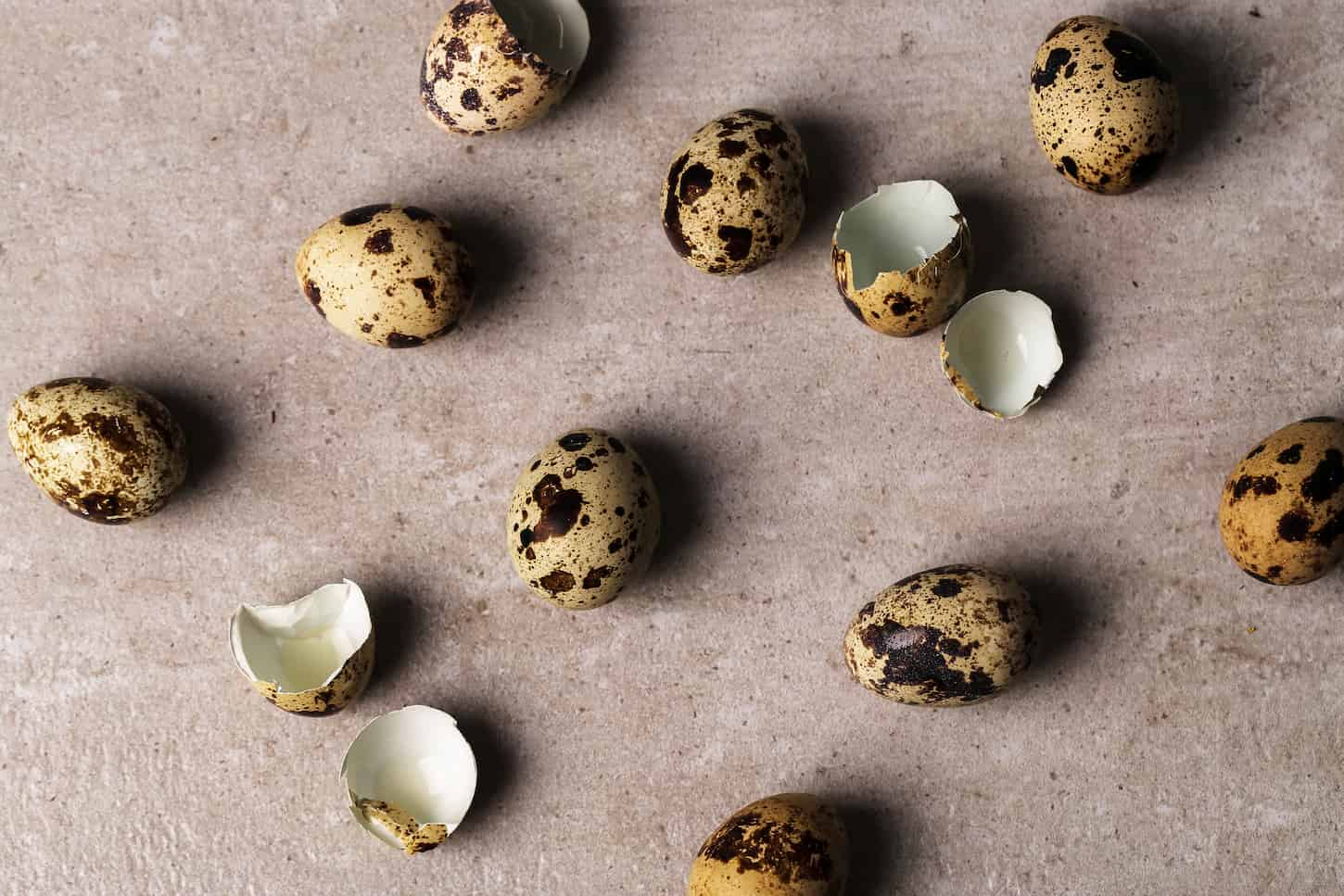
What Animal Products Can Chickens Eat?
Chickens can eat many animal products, including their own eggs and shells. However, most animal products are quite rich, so you shouldn’t feed your chickens too many animal products.
Take a look at the list below for information about the different types of animal products chickens can eat.
- Yogurt – Chickens benefit from the probiotics found in yogurt, and it’s also rich in calcium and protein. However, don’t feed your chickens large amounts of yogurt, and don’t give them sweetened yogurt because it’s high in sugar.
- Cheese – Cheese is a good source of calcium and protein for chickens. However, it’s fatty, so don’t give chickens too much. Cottage cheese is the healthiest type of cheese for chickens.
- Eggs – Eggs are a good source of protein for chickens, but always give them cooked eggs – scrambled or boiled is best. If chickens get a taste for raw eggs, they might start eating their own.
- Fish and Seafood – Chickens love to fish and seafood. However, you should remove the bones before you give fish to your chickens.
- Eggshells – Eggshells are a good source of calcium and grit for chickens.
- Meat – Chickens enjoy eating meat, but you should never give them moldy or processed meat.
- Dried Cat or Dog Food – Chickens go crazy for dried pet food, but there’s not much information on its safety. A few bits of dried pet food is probably ok for chickens, but don’t feed them too much.
What Human Food Can Chickens Eat?
The great thing about chickens is they happily devour leftovers and reduce food waste. But before you give your chickens kitchen scraps, it’s good to know what human foods they can and can’t eat.
So, let’s look at the human foods that are safe for chickens.
- Bread – Bread isn’t very healthy for chickens, but they can have small amounts of it occasionally. Whole-grain bread is better for chickens than white bread.
- Cooked Pasta – Past is full of starch, so it’s not healthy for chickens, but they can enjoy it as an occasional treat. Whole grain pasta is better for chickens than white pasta.
- Herbs – Chickens can eat most herbs including basil, coriander, and parsley.
- Nuts – Nuts are fatty, so use them in moderation. To make them easy for the chickens to eat, remove the shells and chop or crush them first.
- Seeds – Chickens can eat most seeds, including sunflower, pumpkin, and chia.
- Oats and Oatmeal – Chickens can eat raw and cooked oats and oatmeal.
- Cooked Rice – Chickens love cooked rice. And whole grain rice is healthier for them than white rice. Never feed chicken uncooked or old cooked rice.
- Popcorn – Only plain popcorn – don’t give them sweet or salted.
- Cereals – Chickens can eat cereals, so long as they’re not high in sugar.
- Peanut Butter – Only in small amounts, though.
What Should You Not Feed Chickens?
Chickens have a very adaptable digestive system, and they can eat most foods. However, some things can be bad for a chicken’s health. For example, fruit from the nightshade family of plants is highly toxic and may kill chickens.
Take a look at this list of the things you should never feed chickens.
- Alcohol and Caffeine – These are both toxic to chickens
- Soft Drinks – Soft drinks contain too much sugar for chickens.
- Processed Food or Fast Food – These foods are generally unhealthy and contain lots of fats and additives, which are bad for chickens. As a rule, if it’s unhealthy for people, it’s unhealthy for chickens too.
- Salty Food – Too much salt is bad for chickens.
- Plants from the Nightshade Family – Plants from the nightshade or Solanaceae family are toxic to chickens. Solanaceae plants include bell pepper, tomato (see listing about tomatoes in the safe fruit section), eggplant, and potatoes.
- Raw or Green Potatoes – Chickens can eat cooked potatoes in moderation, but they should never eat raw or green potatoes. Raw or green potatoes are highly toxic to many animals, including chickens.
- Onions – Not only do onions make eggs taste strange, but they can also be toxic for chickens.
- Avocado – Avocado contains a toxin called persin which can be fatal for chickens. The avocado pit and skin contain the most persin. To be safe, don’t feed your chickens avocado.
- Chicken Meat – Chickens can eat meat but not their own. If they get a taste for chicken meat, they might become cannibalistic.
- Undercooked or Dried Beans – Beans are a great source of protein, but you must soak and cook them before giving them to chickens. Uncooked beans are highly poisonous to humans and chickens.
- Rhubarb – Rhubarb contains oxalic acid, which can cause heart and kidney failure in chickens. Oxalic acid is mostly in the rhubarb leaves, but it’s better to avoid giving your chickens rhubarb altogether.
- Greasy, Fatty Foods – Too much fat is bad for chickens, so don’t feed them greasy foods such as butter.
- Fruit Pits and Seeds – Some fruit pits and seeds contain cyanide and other harmful toxins which can poison chickens.
- Unshelled nuts – Chickens have a hard time cracking nutshells. Furthermore, some shells are sharp and dangerous when cracked, and beaks and claws can get stuck in them easily.
- Chocolate – Chocolate is toxic to many animals because it contains theobromine which can be fatal in large amounts. Dark chocolate also contains caffeine which is bad for chickens.
Dark chocolate is more toxic than milk or white chocolate. To be on the safe side, never feed chickens chocolate.
- Wild Mushrooms – Don’t feed chickens unidentified mushrooms because they might be poisonous.
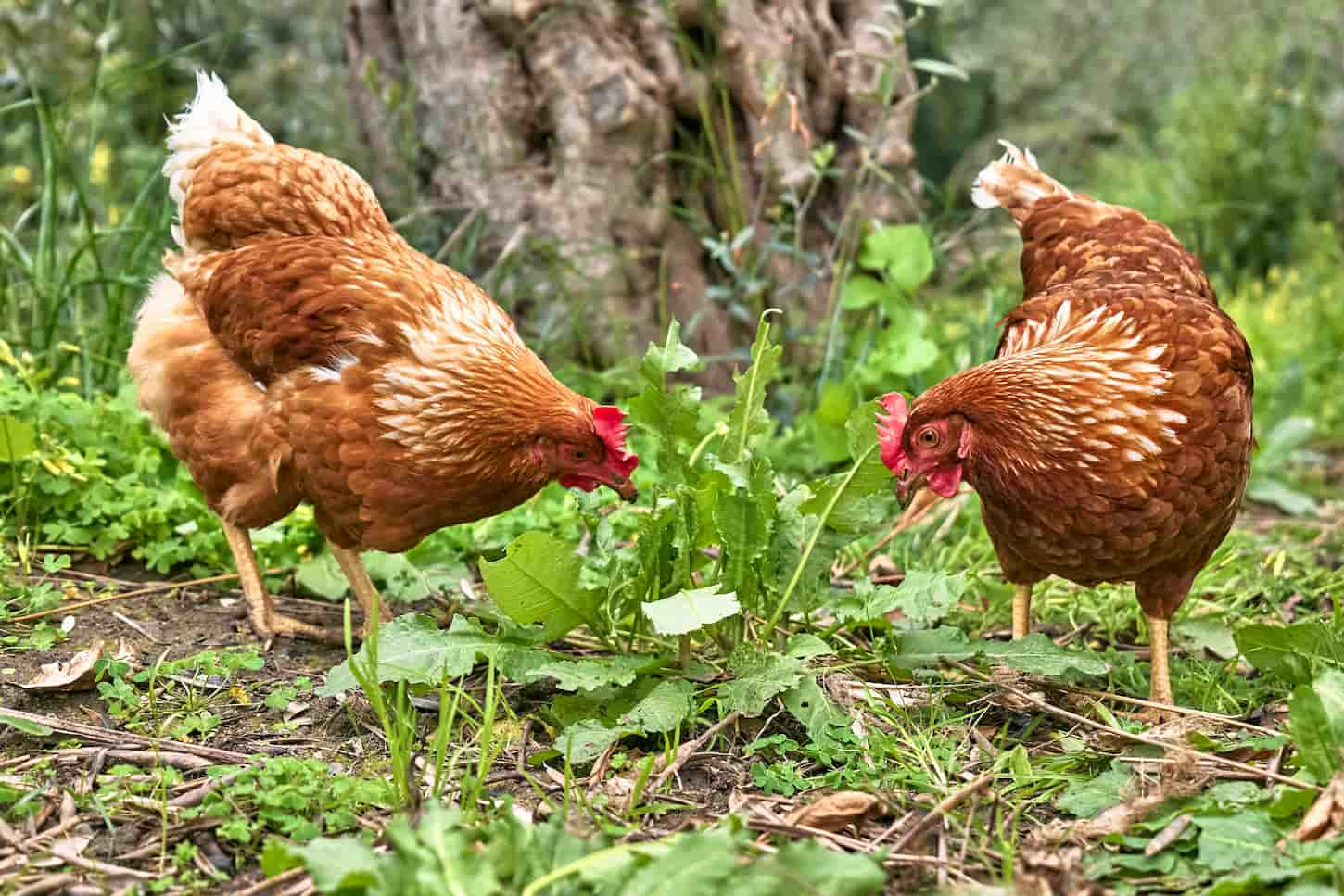
What Chickens Can and Cannot Eat – Frequently Asked Questions
Can chickens eat kudzu?
Kudzu is an abundant, nutrient-rich crop. Some farmers use it as forage for many different farm animals, while it’s seen as a weed that’s taken over the countryside in other areas.
Chickens can eat the vine tips, flowers, leaves, and roots of kudzu, but they shouldn’t eat the mature vines, seeds, and seed pods.
Want more details on chickens eating kudzu? Read the whole article I wrote here: Can Chickens Eat Kudzu?
Do chickens really eat rocks and dirt?
Rocks and dirt are a normal part of a chicken’s diet, so don’t be alarmed if you see them eating earth.
You see, chickens don’t have teeth. Instead, they swallow food whole and grind it up in something called a gizzard. The gizzard is like a small stomach, and it crunches food up better with the help of grit and dirt.
Want all the fun details about why This is Why Chickens Eat Rocks and Stones? Read that article I wrote!
Do chickens eat mice?
Chickens are omnivores, which means if they get the opportunity, they will catch and eat small animals such as mice, frogs, and lizards.
It’s safe for chickens to eat mice if they aren’t diseased or decomposed. Sometimes you might even see chickens chase mice to try and eat them.
Want more information on how chickens catch and eat mice? Read my article, Do Chickens Catch and Eat Mice? (In Coops, Fields, etc) next.
Best Products For Feeding Chickens
Need some easy ways to keep your chickens fed, housed, and happy? Here are some easy products to get your research and shopping going faster. Plus, they’re available online. That being said, be sure to shop local when you can. Buying online is convenient, but buying local is usually better!
Best Chicken Feed:
- Grubblies natural grubs and black soldier fly larvae chicken snacks (click here to see the current pricing on Amazon).
- Chicken scratch is usually best-priced locally at a feed store, but sometimes you just need to have it delivered. This MannaPro scratch is a quality option, and it’s on Amazon.
Chicken Grit:
- Grit with probiotics can be a great option to keep your flock healthy. This insoluble crushed granite with probiotics from MannaPro on Amazon is a great option if you don’t have any local crushed oysters for a great price.
Moveable Chicken Enclosure:
- Need to keep your chickens enclosed and safe? This chicken shelter (available on Amazon) is small enough to be easily moved, while large enough to easily let your hens forage in a safe area. Need a bigger or smaller one? Awesome. There are various size options available!
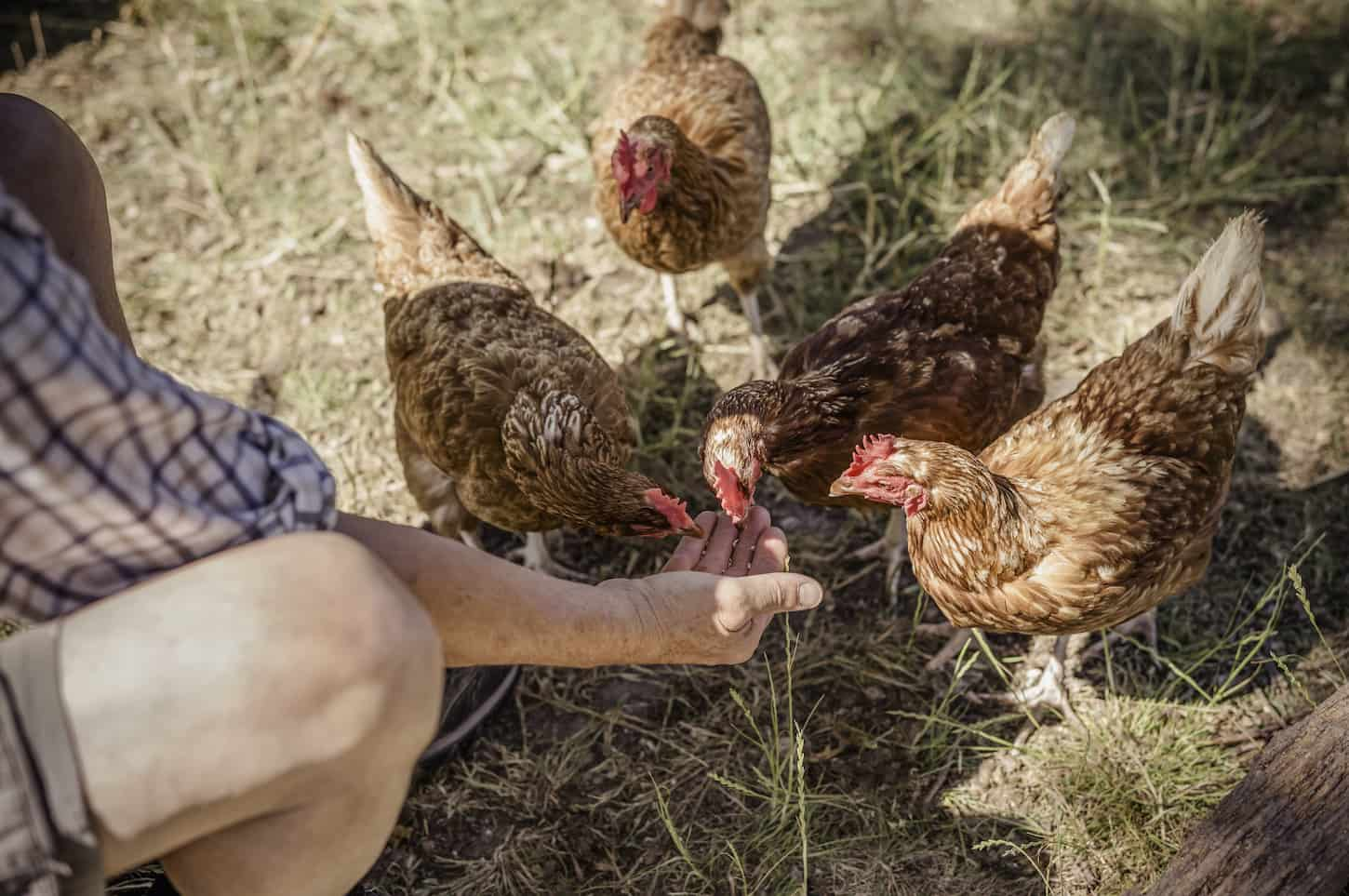
Key Takeaways and Next Steps
The list of things chickens can’t eat is pretty small, but vegetables such as avocado and potato can be fatal for chickens, so never feed chickens food they shouldn’t eat. Enrich your chicken’s diet and the environment with fresh fruit and vegetable snacks.
However, chickens need a balanced diet, so never feed them more than 10 percent of their diet in treats. Too many treats can lead to nutritional deficiencies and health problems. Always feed chickens according to their needs and make sure they have constant access to clean water and grit.
Want to take your chicken diet all-natural so you can avoid using commercial feed? I’ve broken down everything they need to eat in this article here: How to Raise Chickens Without Feed (And Why it’s Better!). Even if you don’t go all-natural, it’s a great read so you understand what to feed (and what not to feed) your chickens, so go give it a read next!
Resources
Learning from your own experience is essential, but learning from others is also intelligent. These are the sources used in this article and our research to be more informed as homesteaders.
- Adamafio, N. A. “Theobromine Toxicity and Remediation of Cocoa By-Products: An Overview.” Journal of Biological Sciences, vol. 13, no. 7, 2013, pp. 570–76. Crossref, doi:10.3923/jbs.2013.570.576.
- Chowdhary, Sonali, et al. “Effect of Dietary Inclusion of Turmeric (Curcuma Longa) and Garlic (Allium Sativum) Powders as Feed Additives on Performance of Broiler Chicken.” Indian Journal of Animal Nutrition, vol. 38, no. 1, 2021, pp. 92–99. Crossref, doi:10.5958/2231-6744.2021.00014.1.
- Gennetta, Nicole. “The ULTIMATE List of What Chickens CAN and CANNOT Eat.” Heritage Acres Market LLC, 22 May 2021, www.heritageacresmarket.com/what-chickens-can-and-cant-eat.
- Graves, Andrea. “Chili-Eating Chickens Repel Bacteria.” New Scientist, 20 Aug. 2001, www.newscientist.com/article/dn1171-chilli-eating-chickens-repel-bacteria.
- Grzybek, Maciej, et al. “Evaluation of Anthelmintic Activity and Composition of Pumpkin (Cucurbita Pepo L.) Seed Extracts—In Vitro and in Vivo Studies.” International Journal of Molecular Sciences, vol. 17, no. 9, 2016, p. 1456. Crossref, doi:10.3390/ijms17091456.
- Lee, April. “What Fruits Can Chickens Eat?” Farmhouse Guide, 8 Feb. 2021, farmhouseguide.com/what-fruits-can-chickens-eat.
- “List of Plants in the Family Solanaceae | Genera and Species.” Encyclopedia Britannica, www.britannica.com/topic/list-of-plants-in-the-family-Solanaceae-2026039. Accessed 27 Jan. 2022.
- Roberts, Victoria. “The Basics of Keeping Back Yard Chickens.” Veterinary Nursing Journal, vol. 24, no. 9, 2009, pp. 18–21. Crossref, doi:10.1080/17415349.2009.11013124.
- “VM61/VM029: Avian Goiter (Thyroid Hyperplasia or Dysplasia).” IFAS University of Florida, edis.ifas.ufl.edu/publication/vm029. Accessed 26 Jan. 2022.
- “What Should I Feed My Backyard Hens?” RSPCA, 9 Nov. 2018, kb.rspca.org.au/knowledge-base/what-should-i-feed-my-backyard-hens.
Thank for the information was helpfull
You’re welcome! Always glad to pass on what we’ve learned.